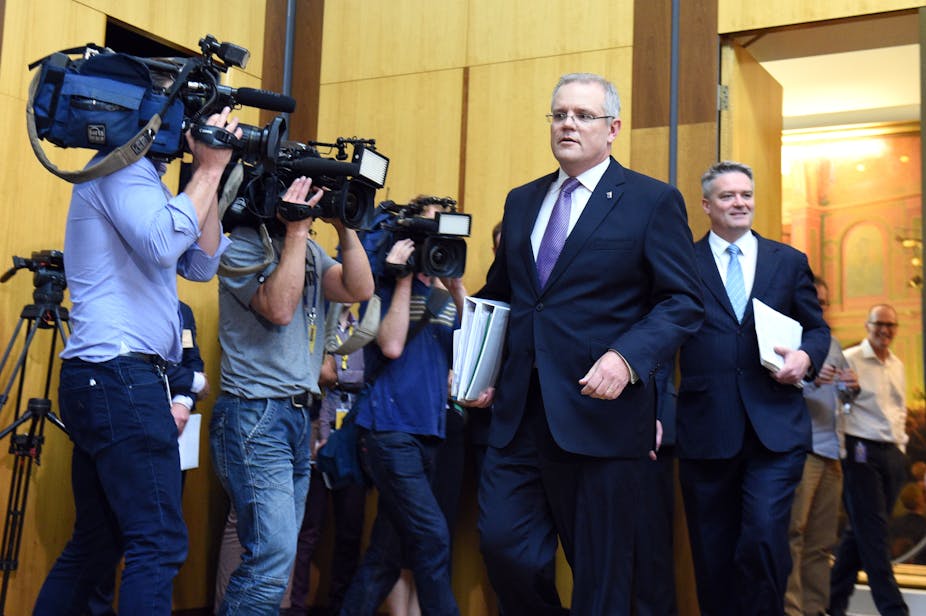What a paradox! This is an election-eve budget without big sweeteners to woo the voters.
Look in the “show bag” and the contents are sparse, apart from raising the tax threshold from $80,000 to $87,000 at which people move into the 37% marginal rate. Those earning under $80,000 get no income tax relief.
And there are some hits to disappoint – like the new child care arrangements being put off for a year.
The government has backed its own rhetoric about investment and jobs – and the economic argument that says the way to boost the economy is via company tax cuts. It would have preferred to be able to accompany these with more relief on the personal income tax side but the money was not there.
The budget’s main beneficiaries are smaller businesses, with a regimen to reduce their tax progressively from July 1 with an initial cut from 28.5% to 27.5%. Big business will have a long wait for its tax cut. In the fashion of today’s political promising, the government pledges all businesses will be down to 25% at the end of 10 years.
The government has been restrained by a lack of funds from normal giveaways. It knows it will need to demonstrate its economic credentials are better than Labor’s, so a cash splash would be counter-productive two months out from an election.
Even with this restraint however, the deficit will only be reduced by a fraction next financial year from $39.9 billion to $37.1 billion. A return to balance is projected by 2021 – so far over the horizon that it may turn out to be a mirage. The “deficit disaster” is for the Coalition the language of opposition days.
While this budget is mild on the cutting side we have been given a revealing clue about the future.
Treasurer Scott Morrison said payments as a share of the economy would fall from 25.8% in 2015-16 to 25.2% in 2019-20. But a strong message at his press conference was that spending was still not at a sustainable level and had to be attacked over the longer term.
This is surely a warning that the next budget of a re-elected Turnbull government, with Morrison as treasurer, would have the axe out in a way that was not possible, for both economic and political reasons, this time.
The budget contains some assumptions open to argument. It estimates a 1% increase in GDP as a result of its “Ten Year Enterprise Tax Plan” – this gain however takes more than a decade to be realised.
More immediately, the budget assumes that nominal GDP will rise from 2.5% in 2015-16 to 4.25 in 2016-17. When pressed on whether this was credible, Morrison could only say it was a Treasury figure. Nominal GDP growth is important because it is the key driver of tax revenues, and hence the deficit.
To make its company tax cuts more acceptable, the government is putting much emphasis on a crack down on multinational tax avoidance, although whether the measures it propose will be up to the task remains to be seen.
Being tough on wealthier people’s superannuation tax breaks is a Turnbull signature - because his predecessor Tony Abbott would not touch this area. Hitting this group produces significant revenue gains. The government has reinvested some of the proceeds in making the superannuation system more flexible for people, including many women for whom the present arrangements have been too rigid. The superannuation initiative for low-income earners is just in effect a continuation of Labor’s program that would have ended without fresh action.
The government has grabbed revenue where it can, including by adopting holus bolus Labor’s increase in cigarette excise, which Abbott condemned as a tax on workers. This is a sensible move although it raises considerably less funds than Labor’s initial estimate of savings.
A saving has been made by ending the compensation for the carbon tax for people coming onto benefits.
The Coalition in opposition took over this compensation for the purposes of the 2013 election, even though it was planning to abolish the carbon tax. Existing recipients will be grandfathered, which limits the revenue gained. The $1.3 billion savings are being put into helping fund the voracious National Disability Insurance Scheme. Again, a sensible move.
Morrison said this was “not just another budget” but “an economic plan”.
Will the plan get the government’s election pitch off to a good start? That will much depend on whether people accept the narrative about investment, growth and jobs, believe the overall package is reasonably fair, and - in the case of lower income earners - are not alienated by the answer to the question “what’s in it for me?”
Morrison argues that Australians have moved on from the old way of looking at things in terms of “winners and losers”. It’s a bold assertion about to be tested.

